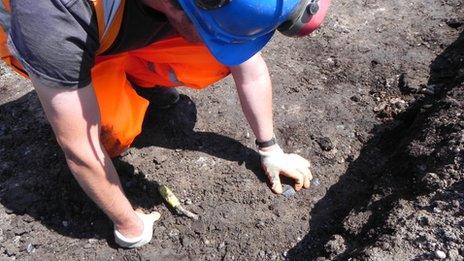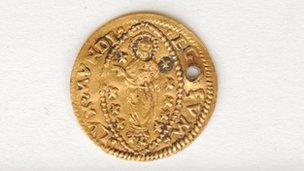Crossrail unearths evidence humans lived on Thames in 7,000 BC
- Published

Lead archaeologist Jay Carver said the flint factory was an "exciting find"
Rare evidence that humans lived on the River Thames 9,000 years ago has been discovered by archaeologists working on the Crossrail project.
A Mesolithic tool-making factory featuring 150 pieces of flint was found at the tunnelling worksite in Woolwich.
Archaeologists said prehistoric Londoners were using the site to prepare river cobbles which were then made into flint tools.
Gold has also been discovered at its site in Liverpool Street.
Archaeologists said they were mystified as to how such a precious and expensive gold item made its way to what was then regarded as a deprived area.
They believe the 16th Century gold coin was used as a sequin or pendant, similar to those worn by wealthy aristocrats and royalty.
Also at Liverpool Street, a well made Roman road has been discovered - complete with a human bone found in the road's foundations.
Next year, archaeologists will begin excavating 3,000 skeletons from Bedlam, a 17th Century burial ground close to Liverpool Street.
'Exceptionally important location'
Archaeologists are hopeful that when they start large scale excavations to remove the skeletons they will also locate more of the Roman road, along with foundations of Roman buildings that stood alongside it.

The gold coin is a rare find for the Liverpool Street area
Of the tool-making discovery, Crossrail lead archaeologist Jay Carver said: "This is a unique and exciting find that reveals evidence of humans returning to England and in particular the Thames Valley after a long hiatus during the Ice Age.
"It is one of a handful of archaeology sites uncovered that confirms humans lived in the Thames Valley at this time.
"The concentration of flint pieces shows that this was an exceptionally important location for sourcing materials to make tools that were used by early Londoners who lived and hunted on Thames Estuary islands."
Starting in 2018, Crossrail will link Maidenhead, Berkshire, in the west to Shenfield, Essex, and Abbey Wood, south-east London, in the east.
- Published1 August 2013
- Published8 May 2013
- Published25 January 2013
- Published4 January 2013
- Published24 December 2012
- Published5 October 2012
- Published23 March 2012
- Published15 March 2012